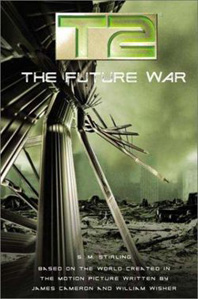I’m curious to hear from my readers on this one: How important is it to you that a franchise has continuity between each of its installments? I ask this because two of my favorite sagas are “Star Wars,” in which every story fits on a coherent timeline, and “Terminator,” which has launched three distinct timelines since 2001 between movies, TV and books.
Certainly, Hollywood doesn’t care too much about continuity, because it’s always relaunching stuff. A few years back, “Superman Returns” was in theaters while “Smallville” was on TV; they had no connection to each other. “Hulk” and “The Incredible Hulk” were released five years apart but had no connection to each other. The Joker was brought back to life in the “Batman” franchise even though he died (and acted completely different) the last time we saw him. “Star Trek” did a “same characters/new timeline” thing in a movie earlier this year.
Most egregious, though, is the “Terminator” franchise, which is so sloppily convoluted that I find it utterly fascinating. I’ll leave the comic books (from eight different publishers through the years, so there are probably at least eight more timelines) and the young adult novels (“T2: The New John Connor Chronicles” by Russell Blackford, written in 2002-03) out of this discussion so I can keep things more or less coherent. But just remember that it’s even worse than I’m making it sound.
OK, here goes …
After the first two movies, everything tied together nicely. Then “Terminator” creator James Cameron said the story was complete as far as he was concerned, and other authors took over; all were left to their own devices. It wasn’t a single vision — like with “Star Wars,” which actually has “continuity editors” overseeing all the fiction that gets written — it was multiple visions.
The first continuation of the saga came from S.M. Stirling, who wrote three books under the “T2” imprint (“Infiltrator,” “Rising Storm” and “The Future War”) in 2001-03. They could’ve been a blueprint for a movie; he imagines a new role for Arnold Schwarzenegger as Dieter, an Austrian spy on whom the T-800 body and face would be molded. Sarah and John fight and dodge (mostly fight) Skynet in the first two books. The third book takes place post-Judgment day, and covers about 25 years. John, Sarah, Dieter, Dennis and Mary Reese (Kyle’s parents/John’s grandparents) and a young Kyle Reese are key members of the Resistance fighting the machines.
“The Future War” hit bookshelves on June 17, 2003, and “Terminator 3: Rise of the Machines” hit theaters a few weeks later. In “T3,” Sarah has died of cancer, and John is sitting around waiting for Judgment Day when he meets his future wife, Kate, and another “Uncle Bob” Terminator (played by Arnold), who tells him J-Day is coming. In the end, John and Kate can’t stop J-Day, but they at least survive it.

Aaron Allston wrote two books in conjunction with “T3” (“Terminator Dreams” and “Terminator Hunt”) in 2003-04. “Dreams” tells of inventors who unwittingly design Terminators for Skynet just before Judgment Day. “Hunt” finds John and Kate leading the resistance in the future, along with a teenage daughter.
“Terminator: The Sarah Connor Chronicles,” launched by Josh Friedman in early 2008, is the third distinct continuation of “T2.” Here, Sarah is alive, and she, John, Cameron (a good Terminator from the future) and Derek Reese (Kyle’s brother from the future) fight and dodge (mostly dodge) Skynet. We also see how the embryonic Skynet is shepherded by a woman (played by Shirley Manson) who only the audience knows is a T-1000.
The final episode of “Sarah Connor Chronicles” aired on April 10, 2009, and barely a month later, “Terminator Salvation” — the continuation of the “T3” saga — hit theaters. The film was preceded by a prequel novel (Timothy Zahn’s “From the Ashes,” released on March 17) that finds a young Kyle Reese scraping out an existence in the future. So for a few months, two completely different interpretations of the “Terminator” story were being produced and promoted simultaneously and independently. (“Chronicles” was canceled around the same time that “Salvation” was being promoted, so obviously the two “Terminator” camps were not working together).
Now, as for the plot points: In “Sarah Connor Chronicles,” Kyle and Derek are born before J-Day. In both Stirling’s “T2” saga and the “T3” saga, Kyle is born after J-Day. In neither of these cases does he have a brother; he has parents in Stirling’s “T2” saga, but they aren’t mentioned in the “T3” saga.
Although “Terminator Salvation” is a continuation of “T3” (in the sense that John and Kate are leading the resistance), it contradicts Allston’s “T3” books by having Kate pregnant with their daughter later on the timeline than Allston had established. It also contradicts facts about the machines that James Cameron had established in the first two movies.
“T3” explores the “Future is not set” theme when it has John waiting around for J-Day. It does happen, but later and in a different way than he thought it was “supposed” to happen. This is because John is on the “T2” timeline (which becomes the “T3” timeline) and his knowledge of the future is based on the “T1” timeline (which had become the “T2” timeline).
But anyway, I don’t have a problem with different timelines that are part of a single story. I have a problem with different timelines that come about because different parties are telling contradictory “Terminator” stories at the same time.
(An interesting side note: I just read Stirling’s books recently, and I was totally picturing Thomas Dekker and Lena Heady [from “Sarah Connor Chronicles”] as John and Sarah, even though Stirling was naturally picturing Edward Furlong and Linda Hamilton [from “T2”] when he wrote the books. For “The Future War,” though, I sometimes pictured the actor who played John in the battle sequence at the beginning of “T2.” And sometimes Nick Stahl from “T3” entered my mind a bit, but I didn’t picture Christian Bale as John, even though he is the actor who currently possesses the role.)
In a “Star Wars” vs. “Terminator” discussion, I side with “Star Wars” in part because every new story respects the stories that have been told previously. When I watch “The Clone Wars,” I know Anakin will turn into Darth Vader. In some ways, it’s mildly depressing. But it’s vastly preferable to having the writers decide “This time, he doesn’t turn into Darth Vader,” and starting an alternate timeline. Some might say George Lucas meddles too much (I don’t think he does), but it is reassuring to know that there will never be a “relaunch,” “remake” or “alternate interpretation” of “Star Wars.”
But with the way most franchises operate (and the way those franchises — “Terminator,” “Star Trek,” “Batman,” etc. — get substantial viewership and ticket sales), I wonder if my pro-continuity stance puts me in the minority.
I hope I’m not. Let me know what you think.

